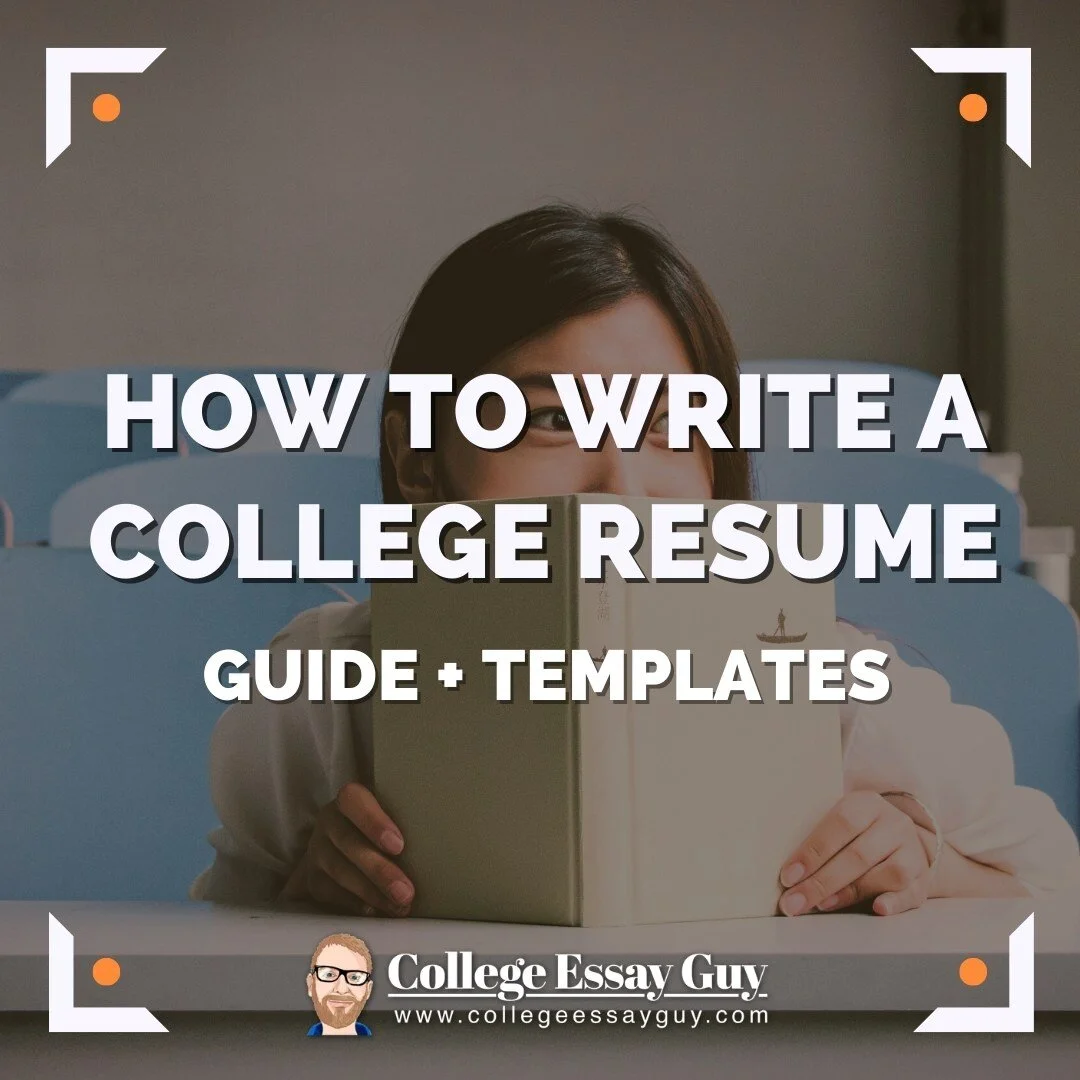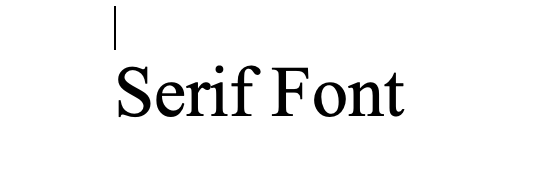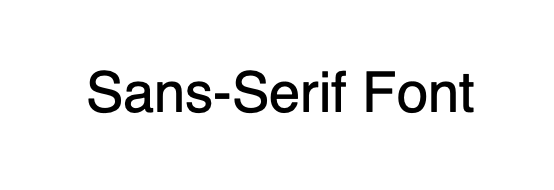
Written by Alexis Allison, College Essay Guy Team
How do you sum up your life’s work on a single piece of paper?
First things first. Remember that you are not your college resume. You are a human being, not a human doing. If you don’t have a rockstar resume, that’s okay. Work with what you’ve got.
Now that we’ve got the touchy-feelies out of the way, let’s talk about how to write an amazing resume.
TABLE OF CONTENTS - How Important is the College Resume?
- How Do I Pick a College Resume Template?
- What Are The Most Important Parts of a College Resume Template?
- Contact Information
- Education
- Experience
- Awards and Honors
- Skills
- Finishing Touches
- What do I do With My College Resume?
- Contact Information
- Education
- Experience
- Awards and Honors
- Skills
How Important is the resume for college?
Well, it depends.
In general, most colleges have a dedicated space on their application system called the Activities List where you will be able to list out all of the things you’ve been involved in outside of school. That section is your BEST place to share those details. Don’t skip it.
However, some colleges offer the option of submitting a separate, more traditional style resume. (Think PDF-style resume that you upload.)
If you feel like you’ve totally communicated all of the important details in your Activities List, you may not need to submit a separate resume. In fact, for many colleges, you may not even have the opportunity to upload a traditional PDF resume.
But if given that option, should you do it?
Some colleges strongly recommend that you submit a resume along with your application (see UT Austin’s policies for certain programs.) While others forbid it (see UVA’s FAQ section.) So be sure to check with individual colleges to see what they prefer.
However, keeping a professional resume on hand will serve you in a few other ways. How?
Your resume:
Serves as a foundation for the Common App Activities List (or vice versa—see this post if you’ve already written your activities list).
Gives teachers and counselors a framework for their letters of recommendation.
Provides you with a list of ready-made talking points for an admissions interview.
May inspire your Common App essay.
Is a requirement for many scholarships or internship and employment opportunities (read: $$).
Finally, it’s like having your own business card. There’s a “professional cool” factor when you’ve got a slick resume to slap on someone’s desk.
Now, let’s make one.
For this post, we use examples from this resume template—but feel free to use any of the others linked below.
College Resume Templates:
College Resume Template #1: Microsoft Word or Google Docs
College Resume Template #2: Microsoft Word or Google Docs
College Resume Template #3: Microsoft Word or Google Docs
College Resume Template #4: Microsoft Word or Google Docs
College Resume Template #5: Microsoft Word or Google Docs
College Resume Template #6: Microsoft Word or Google Docs
Note: To use these example college resume templates yourself: Click on the link, go to "File" > "Make a copy..." > "Ok"
We also recommend checking out some of Canva’s ready-to-use, customizable resume templates. Choosing the right template is kind of like choosing the right outfit for an interview. You want it to look sharp and feel like you. Ultimately, though, the outfit (or template) doesn’t guarantee success—it’s how you rock what you’ve got that matters the most.
For whichever template you choose, make sure you do the following: Go to File > Make a copy, and copy the document to your Google Drive.
Read along and make it your own!
How do I Pick a College Resume Template?
You’ve heard it’s what’s on the inside that counts. Well, when it comes to college resume templates, looks matter too. Think of the resume like your first impression.
Here are some things to consider when it comes to format and design.
(Don’t) Give ‘em Helvetica. Choose a serif font. What’s a serif font? It’s a font with little feet at the bottom of each letter, like Times New Roman. The opposite of a serif font is a sans-serif font, like Helvetica—no feet, see? A serif font looks a little more traditional and professional on a resume.
Create a style for each level of information. Bold or capitalize headings. Use italics or underline if you’d like. Make use of bullet points. The key here is consistency. There’s not one right way—just choose a style and stick to it.
Commit to one page. Your concision will gain you brownie points from college admissions counselors who’ve read one too many applications.
Respect white space. Leave the document’s margins at 1 inch. Keep a space between each section. White space is both a useful design tool and gentle on the reader’s eyes.

Use this one. Ex: Times New Roman

Don’t use these. Ex: Helvetica
How to write the college resume:
Here are 5 things you need for your college resume:
Relevant contact information
Detailed education history + test scores
Experiences (think “Activities List”!)
Awards/honors
Additional skills
I recommend sharing those details in this order, from top to bottom: contact information, education, experience and skills. If you’ve received honors and awards, you’ll have a separate section for those, too—but not all of us are that cool.
1. Contact Information
Include the following:
Your name. If you go by a nickname, use the name that’s attached to your college application—again, consistency is key.
A professional email that you check regularly. If you don’t have one, make one. If you’re still using ZendayaLover99 from middle school, it’s time to make a change—for everyone’s sake.
Your cell phone number.
It might look something like this:
John Smith
john.smith@gmail.com
123-456-7891
2. Education
This section requires a little more work. Include the following:
High School Name, City, STATE (start year – end year).
GPA, weighted and unweighted.
Best test scores (ACT, SAT, SAT Subject Tests, AP).
Relevant coursework. This section allows you to show off any extra classes you’ve taken in high school that reflect an interest in your major. So, if you want to be a doctor and you’ve taken Anatomy, add it!
Here’s a sample:
North Shore High School, Somewhere, TX (2015-2019)
GPA: Weighted: 3.6 / Unweighted: 3.2
SAT: 1200
ACT: 30
Relevant Coursework: Advanced Journalism, Desktop Publishing, Multimedia Graphics
3. Experience
Remember those kids who started random clubs like underwater basket-weaving just so they could write “Club President” on their resumes? Even if the club never met? Right.
This section is your chance to show that you’re different, because it’s more than just your responsibilities. It’s also about your accomplishments. What’s the difference?
Responsibilities vs. Accomplishments
Maybe the underwater basket-weaving club president was responsible for hosting meetings, planning events and organizing a fundraiser. But if she didn’t actually accomplish any of those things, she can’t add them to her resume. So consider both your responsibilities and accomplishments, whether in a club, on a team, at a job, through a service project, etc. and then think of those accomplishments in terms of numbers.
Why numbers matter
Numbers give context and scale, plus they can help you stand out. Here’s what we mean:
Say you’re the editor of your school’s newspaper. Think back to how many papers you’ve published. How many articles? How many meetings have you led? How many students in each meeting? Say you babysit neighborhood kids. How many kids? How old are they? How often do you babysit? For how long each time? Maybe you work at a coffee shop. How many shifts per week? How many hours per shift? How many people do you serve on average each shift? Maybe you’re the team captain for your lacrosse team. How many warm-ups do you lead each week? For how many teammates? Do you lead team study sessions to help keep everyone’s grades up? How often?
Use strong active verbs
Once you’ve got the numbers, think of active verbs that describe exactly what you did. Here’s your chance to show that you’ve led, managed, organized, created, problem-solved, budgeted, maintained, coached, produced, written, presented, scheduled, built, developed, traveled, bought, bid, sold, delivered, etc.
Some tips for organizing the Experiences section of your college resume:
List experiences in reverse chronological order, starting with your most recent activities and working backward.
For each activity, list the organization/business (even if it’s just your school), location, your position, and the dates of experience. The dates show much you’ve invested in that activity.
Avoid first person. Instead of saying “I managed,” just say “managed.”
Keep verb tenses consistent. So, if you’re still participating in the activity, use present-tense verbs. If you’re not, use past-tense verbs.
Want a huge list of verbs you can use to perfectly describe your experiences? Boom, here you go.
Need help thinking about your experiences?
Sit down with a parent, guardian, teacher who knows you well, or good friend, and ask them to help you remember what you’ve done.
Note that “experiences” can include lots of things. Don’t sell yourself short; even taking care of your younger siblings could count (if you’ve spent significant time and energy!).
Other ideas for your Experiences section:
Taking care of an elderly neighbor.
Volunteering at your house of worship.
Organizing weekly pick-up basketball in your neighborhood.
Working on your parent’s/friend’s car.
Organizing a fantasy football league in your class.
Serving on the board or council for an organization/group.
Taking summer art classes.
Selling homemade crafts on eBay.
Teaching your little sister to play the guitar.
Writing a regular blog about baking cakes.
Showing pigs through your local 4-H troupe.
Competing in local beauty pageants.
Click here for a list of other activities you may not have considered—but that count.
4. Awards and Honors
Think of this section as your trophy case on paper. Maybe your essay last year received second prize in the school-wide writing competition, or your science fair project or miniature pony got you best-in-show. Maybe you’re an Eagle Scout and you earned all 137 merit badges (yes, it’s possible!). Maybe your ball-handling skillz got you Most Improved Player on your JV basketball team.
Get this: you can also include if you were selected for something. (Examples: “1 of 200 students selected to serve as student/admin liaison” or “1 of 4 students chosen to represent our school at the national conference.”)
And, as with the Experiences section, take the time to give a brief, specific summary that captures just how awesome you are. Make sure to do this:
Include the name of the award and, if it’s obscure—or only someone from your town would recognize it—briefly describe what it is.
List the organizations involved, your position and the date you received the award (month and year works).
Be specific and use numbers. First place out of how many schools/teams/participants?
Avoid using “I.”
4. Skills
This final section should be short and sweet, like a toddler eating a cupcake.
What are skills? Anything you can do that could be relevant for college or your major. If you’re hoping to study theater and you can do the Daffy Duck voice or know how to swing dance, include a few gems! These often create great conversation starters for an interview, for example.
Tips for writing the Skills section of your college resume:
Avoid cliches like “punctual,” “passionate,” “organized,” “hard-working,” “team-player.” These days everyone and their mother is a punctual, passionate, organized, hard-working team-player.
Instead, focus especially on computer and language skills. Modern employers lurve ‘em
If you’re a Google Drive maven, add “Google Apps for Work”
If you can rock Word, Powerpoint and Excel, add “Microsoft Office Suite”
If you know how to hack or code, include it.
If you’ve taken Spanish I, include it. If you’re studying Arabic through Rosetta Stone, or High Valyrian through Duolingo, include it!
Some examples of other skills you might include:
Sports-related skills
Technical skills (welding, fixing cars, construction, computer repair, etc.)
Data analysis skills
Communication or teaching skills
Writing skills (Maybe you can create comics, or write screenplays or newspaper articles; maybe you know AP style or APA style like the back of your hand—include it!)
Speech and debate skills
Artistic skills (Which mediums can you work with? With which types of paint do you thrive?)
Interpretation/translation skills (This goes beyond just speaking a language!)
Musical proficiencies (Can you read music? Play five instruments? Sight-read?)
Keep going on the Skills section until it starts to feel ridiculous. Or until you’ve listed, say, 8-10 max, whichever comes first. How do you know if it’s starting to get ridiculous? Give it to at least one person (but no more than three) to edit before you send it out.
NEXT STEp: STAY AHEAD BY GETTING FAMILIAR WITH COLLEGE INTERVIEW QUESTIONS
Finishing Touches
Save your resume as a PDF with a professional, clear title. Include your name and the word “Resume.” Avoid titles like “asdjks.pdf” or “Resume.pdf,” which can come across as unprofessional or confusing. Remember, details matter.
Example: JohnSmith_NYU_Resume.pdf
Don’t write, “References available on request.” It sounds nice, but whoever reads your resume knows to contact you if he or she needs references, so it’s just wasted space.
Don’t include an “Objective.” They know your objective is to get into college, get a job/scholarship/internship. Anything more specific will come across in your essays and interviews.
How to submit your resume for college applications
You’ve got a slick digital resume. Now what?
If you’ve decided it makes sense to share your resume with colleges beyond what you’re sharing in your resume, you can typically do so within each school’s application system.
The Common App typically lets schools decide whether or not to offer an upload function within each colleges individual supplemental section.
If you can afford it and plan to do interviews in person, go to your local office supply store and buy some thick, white or off-white resume paper. Grab a professional-looking folder while you’re at it (no folders with kittens or polka-dots). Print 10 or so copies to keep on hand. When you ask teachers for letters of recommendation, give them a copy. When you walk into an interview, whether it’s for college or a job, bring a copy for every interviewer. Hand one to your significant other’s parents! J/K.
Finally, keep your resume updated. As you gain new experience, skills and awards, add them! If you stay on top of your resume, sending it out in will be a snap (after all, you’ll be in college—you’ve got better things to do).

More Resources
Already written your Activities List and want to turn it into a resume? Here’s how.
Want to see some other college resume templates? Feast your eyes.
Check out my free one-hour guide
Check out my pay-what-you-can course